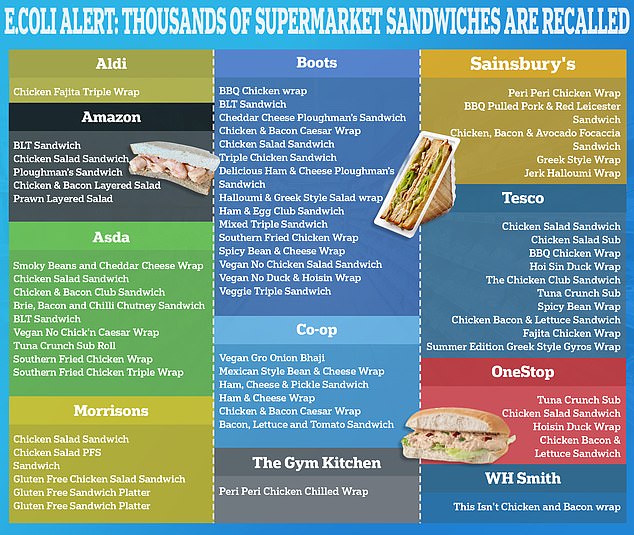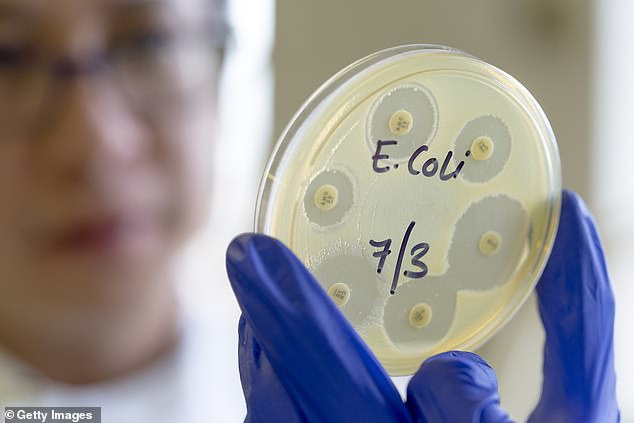Cheshire man, 66, left unable to walk after contracting £4.99 E. coli during outbreak in Britain
A man has claimed he was temporarily unable to walk after consuming a sandwich believed to be contaminated with a rare strain of E. coli.
John Daniels, from Macclesfield, Cheshire, said he suffered severe diarrhea and lost blood two days after consuming Boots’ £4.99 chicken and bacon Caesar wrap in May.
After being rushed to hospital, the 66-year-old was diagnosed with the disease.
But just five days after his discharge, he suddenly suffered from severe bouts of dizziness and weakness and was unable to even walk without assistance.
Tests later revealed that he suffered from the nerve-damaging condition, Guillain-Barre syndrome, following his E. coli infection.
John Daniels, from Macclesfield, Cheshire, said he suffered severe diarrhea and lost blood two days after consuming Boots’ £4.99 chicken and bacon Caesar wrap in May. After being rushed to hospital, the 66-year-old was diagnosed with the disease

‘Do Not Eat’ warnings have now been placed on more than 60 products sold in the likes of Asda, Morrisons, Tesco, Boots and Sainsbury’s
GBS can cause paralysis of the arms, legs or face and leave patients with crippling pain.
Currently over 60 Sandwiches, wraps and salads were sold in 11 large stores hit with ‘do not eat’ warnings for fear that they might contain Shiga toxin-producing E.coli (STEC).
Food safety chiefs have said they are ‘confident’ a lettuce named Apollo is behind the outbreak of the diarrhea-causing bug.
However, exactly how they became infected has yet to be determined.
Reflecting on his ordeal, Mr Daniels said: ‘The past month has been nothing short of traumatic.
‘I’ve never been this sick before so I knew something was very wrong, but to be told I had E.coli and then Guillain-Barre syndrome was a huge shock.
‘My condition went from bad to worse as I developed one complication after another.
‘Physically I am still not well, and I don’t know if I ever will, and it is deeply disturbing to hear how many others have been affected.
“I just hope something is done to prevent it from happening to anyone else.”
In severe cases, GBS can cause life-threatening problems, including breathing difficulties and blood clots. The condition kills about one in twenty people.
About one in 50,000 Britons and Americans gets GBS every year, usually after an infection in which the immune system becomes hyperactive.
The packaging that Daniels said caused his infection was recalled last week by manufacturer Greencore Group, which produces 1.7 million sandwiches every day, making it the largest manufacturer in the world.
A company spokesperson said at the time: ‘As a precaution, we have voluntarily recalled a number of sandwiches and wraps due to a potential food safety risk.
‘Greencore adheres to the highest standards of food safety and we work closely with the FSA and our suppliers to better understand the possible cause of any potential problem.’
Greencore Group told MailOnline today that it had nothing further to add.
A Boots spokesperson said: ‘Following the Greencore recall on 14 June 2024, Boots has recalled a number of its sandwiches and wraps as a precaution.

The UK Health Security Agency typically records around 1,500 STEC-confirmed infections per year. Anyone experiencing STEC symptoms is advised to stay home from work or school until 48 hours after you stop vomiting or have diarrhea, to reduce the risk of spreading the infection to others
‘No positive results of STEC E. coli have been reported in any testing of our products by the Food Standards Agency (FSA).’
It comes as more than 200 Britons are now known to have been affected by STEC in just over two and a half weeks.
At least 67 people have been hospitalized.
The UK Health Security Agency (UKHSA) said a total of 211 cases were recorded between May 25 and June 11.
Of these, 147 were in England, 27 in Wales and 35 in Scotland.
Only two cases have been recorded in Northern Ireland, although officials say this person is likely to have contracted the bug in England.
Victims include children as young as two years old, although the majority are young adults.
The UKHSA has said it expects the number of people falling ill to rise further as it conducts more research using genome sequencing to identify which E. coli cases are linked.
It typically records about 1,500 STEC-confirmed infections per year.
STEC is considered extremely contagious and in up to 15 percent of cases the bacteria can cause hemolytic uremic syndrome (HUS), a life-threatening condition that can lead to kidney failure.
Children under the age of five are at the greatest risk of HUS.
A small proportion of adults may develop a similar condition called thrombotic thrombocytopenic purpura (TTP).
Mr Daniels claimed he had lost around half a kilo in weight and is still being monitored by medical teams.
He has now also instructed lawyers to investigate the cause of the E. coli outbreak.
Sarita Sharma, a specialist public health lawyer at Irwin Mitchell, said: ‘What John has suffered in recent weeks is deeply concerning, and he is understandably upset and saddened by what he has experienced as a result of the E. coli infection.
‘To hear that more than 200 people have also been affected is really shocking.
‘E.coli is a bacteria that can cause foodborne illness, which can lead to stomach upset and in some cases, like John’s, it can lead to other serious health problems.
‘The UKHSA is now investigating and has found that John’s illness is likely to have come from the recalled sandwich.
“It is now critical that lessons are learned, where appropriate, to ensure consumer safety.”
People have been advised to contact NHS 111 or their GP if they or their children show symptoms of an E.coli infection.
For children under five, this may include disinterest in breastfeeding or bottle feeding and signs of dehydration, such as fewer wet diapers.
Both adults and children are advised to call NHS 111 or their GP if they continue to vomit for two days or have diarrhea for a week.
Anyone experiencing bloody diarrhea or bleeding from the bottom should call NHS 111 or their GP immediately.
